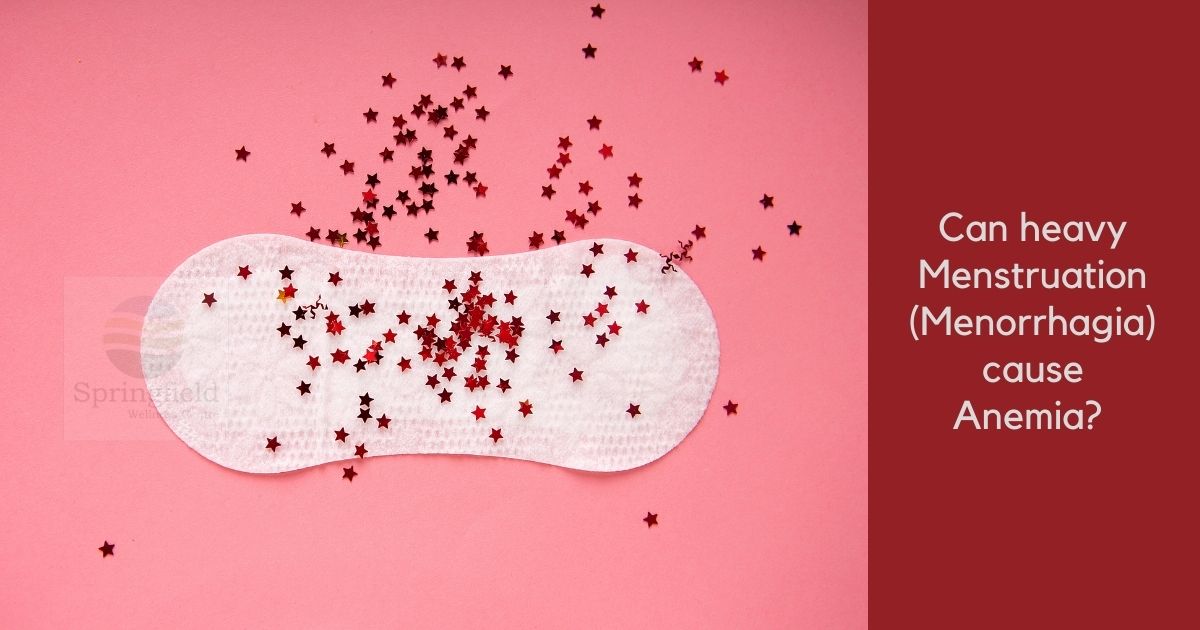Can heavy Menstruation cause Anemia?
We all are aware of the fact that deficiency of iron is one of the primary causes of anemia. Iron is needed by the body in adequate amounts to make hemoglobin. One of the several reasons why anemia can occur is very heavy menstrual bleeding that occurs in some adolescent girl children and women. Let us analyze in detail.
Women lose blood in menstruation. So by default females are prone to anemia as there is blood loss every month. Normal menstruation with normal blood loss generally does not lead to much nutrition loss if the females are taking care to feed themselves with balanced nutritious food. Having said that, we all know that a significant number of adolescent girl children do not take proper nutritious food, and hence the prevalence of anemia among them is higher.
Heavy Menstrual Bleeding in Women
When abnormally heavy bleeding occurs in women during their menstrual periods, it is referred to as Menorrhagia. The amount of blood loss and the number of days the menstruation extends more than 5 days, can contribute to menorrhagia. 1 in 5 women is thought to be affected by such heavy menstrual bleeding or menorrhagia. Such women often dread when they are about to have their periods. All women experience bleeding during their menstruation period. But some are confused if the bleeding should be called normal or heavy. Here is a checklist of symptoms to verify if you have heavy bleeding or menorrhagia.
Symptoms to confirm if you have Menorrhagia
- A need to change sanitary pads every hour for many hours
- Sometimes using double sanitary pads so that all the menstrual flow is absorbed
- A need to change the sanitary pads in the middle of the sleep.
- DIscharging clumps or clots in the blood which is unusually larger in size.
- Menstrual bleeding lasting more than a week
- A general feeling of weakness during the menstrual period which makes you tired and not able to perform your daily chores.
Reasons for Menorrhagia
There are many reasons why menorrhagia can be caused. Some of the reasons are the presence of hormonal imbalance like hypothyroidism, uterine fibroids, polyps, scars tissues in the uterus, conditions like endometriosis, adenomyosis, etc, problems in ovulation due to dysfunction in the ovaries, presence of intrauterine devices for contraception (birth control), certain medications, etc.
Can Menorrhagia be responsible for causing Anemia?
Menorrhagia can certainly play an important role in causing Anemia. It should be noted that if the person has normal bleeding but has good eating habits where iron-rich foods are included in the diet regularly, then the person may not be suffering from anemia. In females with Menorrhagia, the nutrition deficiency and iron deficiency is so wide and large. The heavy blood loss they experience needs to be actually compensated with more-than-normal blood production. So the nutrition may not be sufficient at all in the first place. Furthermore, when acute blood loss happens within a short period of time as in the case of Menorrhagia, that much amount of lost blood cannot be produced by the body at all. Hence if there is acute blood loss coupled with nutrition deficiency, anemia is certain to happen.
What to do if you have heavy bleeding and suspect the presence of Anemia?
If you have the symptoms quoted for Menorrhagia and also suspect that you show symptoms of anemia like pale skin, fatigue, weakness, shortness of breath, dizziness, headaches, etc, then consult your doctor immediately. The doctor might ask you to obtain a Complete Blood Count (CBC) report to determine if you have anemia. Parallelly, if you also have Menorrhagia, the doctor will also ask you to determine the cause of Menorrhagia by prescribing some diagnostic methods. If the presence of Anemia due to Menorrhagia is confirmed the doctor will prescribe you anemia medications (iron supplements) and simultaneously let you know the treatment for Menorrhagia. While some causes for menorrhagia can be treated with medications, other causes like endometriosis, fibroids, polyps, etc might require surgery.
As a general rule, if you are anemic, while you receive treatment for anemia you have to check your blood for the presence of anemia every 3 months for the next 2 years as a protocol till the blood shows stability in iron levels.

